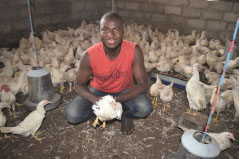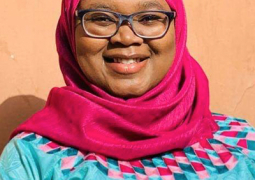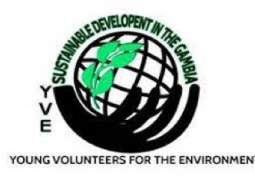
For countries grappling with high rates of unemployment and underemployment, entrepreneurship offers one potential path for the creation of more and better jobs, particularly for young people.
This is the case in The Gambia, where a lack of job opportunities for young people has been an important factor in encouraging high rates of irregular outward migration to destinations elsewhere in Africa and in Europe.
But entrepreneurs in the West African country face a serious obstacle to starting and scaling up businesses: a chronic lack of financing.
Private sector credit in The Gambia is equivalent to only 15% of gross domestic product (GDP), well below the West African average of 59%.
Access to finance is particularly difficult for young entrepreneurs, who report that high interest rates and collateral requirements far in excess of loan value hamper their ability to start new ventures and ramp up job-creating investment.
Micro, small, and medium-sized enterprises (MSMEs), which account for the bulk of employment in The Gambia as elsewhere, find it harder than their larger competitors to obtain financing.
As part of the Youth Empowerment Project, a broader initiative to promote skills-building and the creation of decent work opportunities for young people in The Gambia, ITC has set up three related programmes to help entrepreneurs and businesses access startup and working capital.
The first is a mini-grant scheme targeting grassroots entrepreneurs, with the aim of making it possible for them to purchase equipment, materials, permits and other business-critical inputs.
Applicants submit plans outlining their business ideas, and receive the equivalent of up to $1,000 along with training in financial planning and practice.
To operate the mini-grants, ITC has partnered with the National Association of Cooperative Credit Unions of The Gambia (NACCUG), a local financial institution. Successful applicants submit invoices for their planned purchases to NACCUG, which procures the items directly from vendors and supplies them to the grantees.
For young Gambian entrepreneurs and MSMEs currently unable to access bank credit, a mini-loans scheme offers credit products at reduced interest and against modest collateral, with ITC providing partial loan guarantees.
The loans, which are projected to average $3,000 in value with a ceiling of $10,000, aim to serve as financing for equipment and working capital for up to 580 entrepreneurs and existing small businesses to scale up.
Finally, for high-growth enterprises, ITC is establishing an angel investors network. It would offer young Gambian entrepreneurs access to both capital and mentorship. Meanwhile, for potential investors it would serve as a transparent and impartial channel for assessing potential deals in the country.
The financing schemes serve to complement the Youth Empowerment Project’s work to create a more supportive ecosystem in the Gambia for new and growing businesses by using targeted public support to leverage private investment in skills training and value addition in agriculture, manufacturing and services.
‘Tekki fii!’ – Wolof for ‘make it here’ – is one of the slogans associated with the project: more opportunities for dignified work at home would show young Gambians that they have alternatives to the ‘backway,’ the local term for the perilous journey overland through neighbouring African countries and across the Mediterranean Sea to get to Europe.
As of the end of 2018, a panel of representatives from the Youth Empowerment Project, NACCUG, the Gambian government, and three youth business associations had approved 97 mini-grants – just under one out of every four applications – worth approximately $85,000.
The grantees, 36 of whom are women, have used the funds to open or expand businesses in sectors from poultry and farming to food service and tailoring. They report higher incomes, typically more than projected, with the most successful businesses having already gone on to hire new workers.
The mini-loan programme has disbursed close to $35,000, allowing eight businesses in sectors including fashion, poultry, and food service to expand.
The funds come directly from the partner financial institution, the Social Development Fund, a non-profit development finance institution supervised by the Gambian central bank, which was selected to operate the programme after a competitive bidding process.
It offered the best bids in terms of low collateral requirements – allowing purchased equipment to serve as its own collateral – and annual interest rates of up to 10% compared to market rates of around 18%.
The mini-grant scheme originally targeted 250 grantees by 2021, though given high demand this number – and the associated financial resources – might be increased.
The mini-loan scheme is set to ramp up in 2019, accompanied by outreach to explain the mechanism to potential borrowers.
ITC will support NACCUG and the Social Development Fund to build a bridge between the two schemes to help successful mini-grant recipients go on to access credit to grow their businesses.
Partnerships and staffing preparations are underway to launch the Gambia Angel Investors Network in coordination with the regional ecosystem for angel investing, notably through a partnership with the African Business Angels Network.
Bubacarr Jaiteh
After his attempt to take the backway to Europe ended with him jailed for ransom in Libya, Bubacarr returned to The Gambia in August 2017. He purchased 75 chicks, intending to sell meat and eggs to people in his village near the capital, Banjul.
With the mini-grant he received in April 2018, Bubacarr purchased more chickens along with feed and feeding equipment.
His business, Sonaba Poultry, is now formally registered, with two full-time employees and more than 1,000 chickens. Sales to local mini- and supermarkets pushed his profits to $1,300 in the six months after he received the mini-grant – nearly double what he had projected.
Isatou Jobe
After working in restaurants in The Gambia’s tourism industry, Isatou used a mini-grant to open a restaurant in her home town of Farafenni in the country’s North Bank Region.
Her restaurant, where the 21-year-old prepares breakfast, lunch, and dinner, now employs three women.
Mam S. Danso
Winning a mini-grant allowed the 32-year-old to purchase tailoring machines and office equipment to open up a clothing design business in her home village of Jarumeh Koto in Central River Region North’s Sami district.
Strong demand during religious festivals led to profits worth $400 even after paying wages to herself and two employees.
She does not miss her former jobs in Banjul and now aspires to become one of the biggest entrepreneurs in her region.
Isatou says that training she received in tandem with the grant has helped her manage the business’s finances more effectively.
Source-Gambia Youth news





